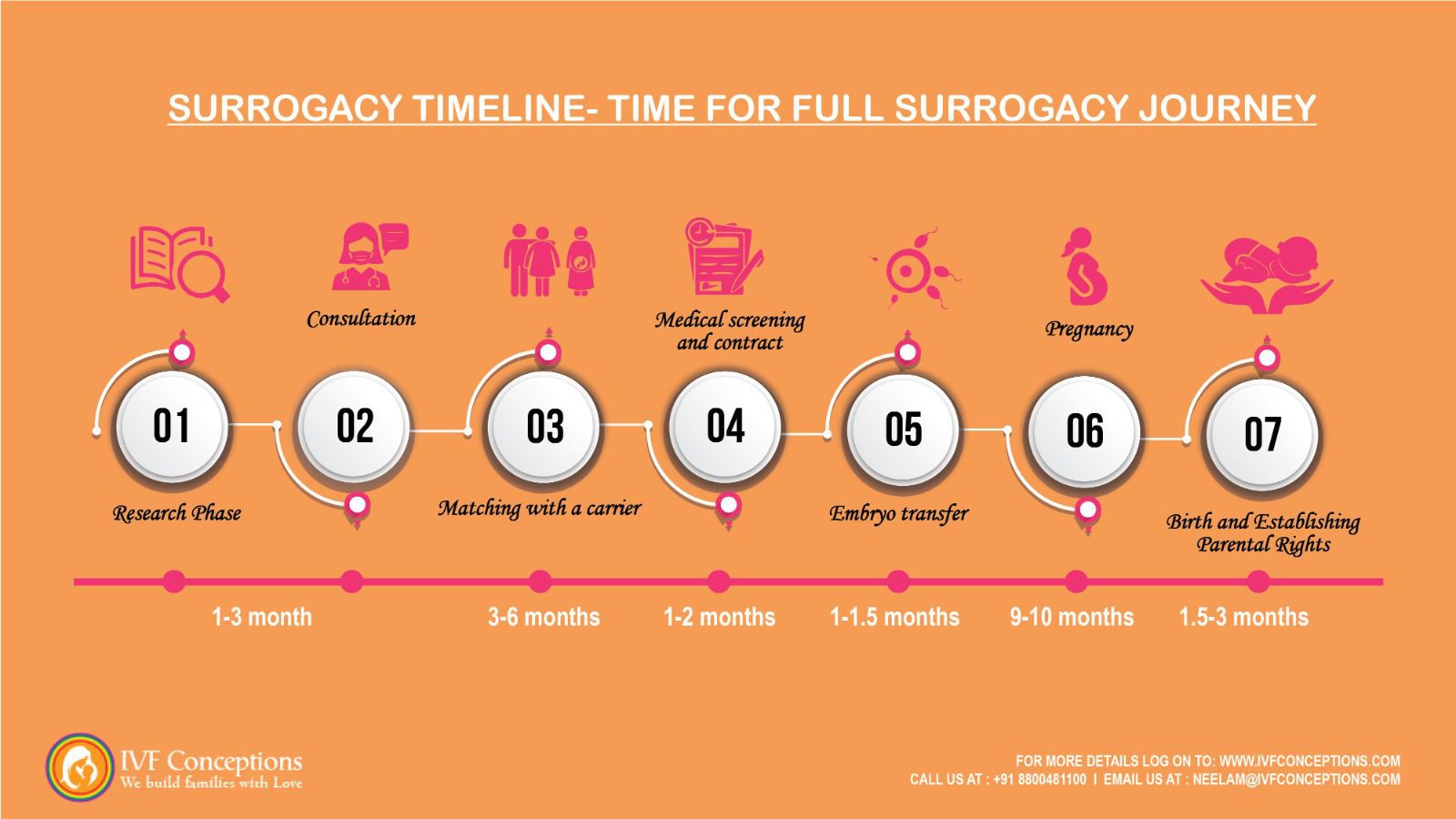Gestational Surrogacy: What You Need to Know


Gestational surrogacy is an increasingly popular option for individuals and couples looking to grow their families. Unlike traditional surrogacy, in gestational surrogacy, the surrogate has no genetic link to the child she carries. This option is a lifeline for intended parents who are unable to conceive or carry a pregnancy themselves.
In this blog, we’ll cover everything you need to know about gestational surrogacy, including how it works, the legal considerations, the cost involved, and why it may be the right choice for you.
If you are struggling with infertility, it is essential to remember that there are many ways to build a family, and gestational surrogacy is one of them.
Get in touch for a Free Surrogacy Consultancy:
📲 +91-8800481100 ( WhatsApp, Line, Viber)
What is Gestational Surrogacy?
Gestational surrogacy is a process in which a surrogate mother (or gestational carrier) carries and delivers a child for the intended parents. The embryo is created using the egg and sperm from the intended parents or donors, and is then transferred to the surrogate’s uterus. In this case, the surrogate has no genetic connection to the baby.
Key Points About Gestational Surrogacy:
- No Genetic Link to Surrogate: The child is biologically related to the intended parents or donors, not the surrogate.
- Assisted Reproductive Technology (ART): In vitro fertilization (IVF) is used to create the embryo and implant it in the surrogate’s womb.
- For a Variety of Intended Parents: Gestational surrogacy is used by individuals or couples, including those facing infertility, same-sex couples, and single parents.
There are mainly 2 types of surrogacy –
The traditional surrogacy type makes use of eggs and natural insemination of the surrogate mother to conceive successfully. The traditional surrogate option is not commonly used.
On the other hand, gestational surrogacy is done through in vitro fertilization (IVF). The sperm and eggs are taken from the father and the intended mother eggs or donor eggs are used to create embryos. Then embryo transfer is done in the surrogate mother.


How Does Gestational Surrogacy Work?
Gestational surrogacy involves several steps that require collaboration between the intended parents, fertility specialists, lawyers, and the surrogate. Here’s an overview of the process:
- Matching with a Surrogate: The intended parents are matched with a surrogate, either through an agency or independently.
- Medical Screening: Both the surrogate and intended parents undergo medical evaluations to ensure they are physically and emotionally prepared for surrogacy.
- Legal Agreement: A surrogacy contract is drawn up to protect the rights of all parties. This contract covers surrogate compensation, medical expenses, and parental rights.
- Embryo Transfer: The IVF process begins, when an embryo is created and transferred to the surrogate. The surrogate then carries the baby to term.
- Pregnancy and Birth: The surrogate carries the pregnancy while receiving medical care. Once the baby is born, the intended parents assume their parental rights, and the surrogate’s role concludes.
|
Gestational Surrogacy Steps |
Description |
|
Finding a Surrogate |
Intended parents find a surrogate through an agency or independently. |
|
Legal Contracts |
A legal agreement is established to protect both parties. |
|
IVF Process |
An embryo is created using intended parents’ or donors’ sperm and eggs. |
|
Embryo Transfer |
The embryo is implanted in the surrogate’s uterus. |
|
Pregnancy & Birth |
The surrogate carries the baby until birth, after which parental rights are transferred. |
Glossary of surrogacy-related terms you need to be familiar with
• Intended parents: Intended parents are those who will become the legal parents of the child born through surrogacy. In most cases, the intended father is both the sperm donor and the child’s legal father.
The intended mother’s legal status is less specific, especially in countries that do not have any particular legislation. Upon the birth of the child, the birth mother’s name might be put on the child’s birth certificate, and by default, she becomes the legal mother. In such a case, the intended mother will have to complete a court process to get a parental right and remove the surrogate as the legal mother.
• Surrogate mother: Also known as a gestational carrier, she is a woman who agrees to carry a pregnancy for the intended parents. As part of the surrogate agreement, she gives complete custody and parentage to the intended parents.
• In vitro fertilization or IVF: IVF is a clinical procedure where the egg is fertilized in the lab and developed into an embryo before implantation into the surrogate mother. If needed, genetic testing is done to rule out abnormalities in the baby.
Characteristics and outcomes of gestational carrier cycles ( Source: CDC)
• Gestational carrier cycles between 1999 and 2013 resulted in 13,380 deliveries and the birth of 18,400 kids. There is data showing that 9,819 of these infants were twins, triplets, and other higher multiples.
• About 16% of intended parents using a gestational carrier were not residents of the USA.
• Intended parents using a gestational carrier were older parents while the gestational carrier was less than thirty-five years of age.
• Gestational carrier cycles’ rate of implantation, pregnancy, and also live births were higher than non-gestational carrier cycles.
Who Might Consider Surrogacy?
• Hopeful single parents who wish to have a biological child
• Couples who are struggling with infertility and need egg donation due to higher age/other medical conditions.
• Same-sex couples want to become parents
• Individuals and couples who do not wish to have a genetic link between their child and the surrogate
• Any female who is not able to safely carry a pregnancy to term

 How to Find A Surrogate Mother?
How to Find A Surrogate Mother?
By far finding the surrogate mother is one of the most important but toughest jobs for an intended parent. Any parenthood journey via surrogacy starts with finding a suitable surrogate mother who is just perfect for you. It is not an easy task but still achievable, with the right help.
#1. Use a surrogacy agency to find a surrogate mother:
You can use a surrogacy agency to find a surrogate. The agency’s responsibility is to help hopeful parents find the perfect surrogate and make all the arrangements. But you need to pay a hefty surrogacy agency fee to get their help for a full surrogacy process.
#2. Use a friend or family member as a surrogate mother:
If you do not want to go through a surrogacy agency, you can ask a relative or friend to be a surrogate for you. Read here, how much does surrogacy cost with a family/friend/ relative as a surrogate?
#3. Explore Online resources to select a suitable surrogate mother:
With extensive internet use within society, prospective intended parents can find the surrogate in various online platforms.
In the same way, a surrogate mother looking for an intended parent can look out for parents within the online community. There are surrogacy directories that make it possible to find each other.
However, you have to make sure that the surrogate is of legal age and has already given birth to one healthy child. That ensures that the surrogate understands the medical risks associated with pregnancy and childbirth, along with the emotional bonding with a newborn.
How Much Does Gestational Surrogacy Cost?
The gestational surrogacy costs vary as it depends on various factors. For instance, if you have asked your relative or friend to become a surrogate for you, she might not take a surrogate mother compensation fee for carrying your child.
Cost of Gestational Surrogacy
Gestational surrogacy can be expensive, with costs varying depending on the country, surrogacy agency, and medical fees. Here is a breakdown of common surrogacy expenses:
- Surrogate Compensation: This can range from $25,000 to $50,000 or more, depending on the surrogate’s experience, location, and the specifics of the arrangement.
- Agency Fees: Surrogacy agencies may charge between $15,000 and $40,000 for their services.
- Medical Costs: The cost of IVF, fertility treatments, and prenatal care can range from $30,000 to $60,000 or more.
- Legal Fees: Legal contracts and establishing parental rights can add another $5,000 to $10,000.
- Miscellaneous Expenses: This includes travel, insurance, and other administrative costs, which can range from $10,000 to $20,000.
|
Cost Category |
Estimated Cost |
|
Surrogate Compensation |
$25,000 – $50,000 |
|
Agency Fees |
$15,000 – $40,000 |
|
Medical Expenses |
$30,000 – $60,000 |
|
Legal Fees |
$5,000 – $10,000 |
|
Miscellaneous Expenses |
$10,000 – $20,000 |

 Pros and Cons of Gestational Surrogacy
Pros and Cons of Gestational Surrogacy
As with any major life decision, gestational surrogacy has both advantages and challenges. Understanding these can help intended parents make informed choices.
Pros:
- Biological Connection: Intended parents can have a biological link to the child through their own sperm or egg.
- Control Over the Process: The intended parents can be actively involved in the pregnancy and childbirth experience.
- Expanded Family Building Options: Gestational surrogacy is an option for individuals or couples who otherwise would not be able to conceive.
Cons:
- High Cost: Gestational surrogacy is expensive, and many intended parents need to budget carefully.
- Legal Complexity: Surrogacy laws can be complex and vary by region, requiring thorough legal preparation.
- Emotional Challenges: The process can be emotionally taxing for both the intended parents and the surrogate.
Read more:
How to reduce surrogacy costs?
Top 4 cheapest countries for surrogacy
What Is the Success Rate of Gestational Surrogacy?
Surrogacy success rates are 95% depending upon many factors. Compared to other fertility treatments, it has a much higher success rate. That mainly depends on the health and age of the surrogate mother and advanced reproductive medicine.
Using gestational surrogacy gives a chance to the fertility specialty to choose a lady who has an excellent reproductive history and is healthy enough to carry a surrogacy pregnancy to term. Besides this, a significant advancement in medical technology gives better chances of conception than before.
In case of male infertility, possible to use donor sperm.


Who Can Benefit from Gestational Surrogacy?
Gestational surrogacy offers a viable solution for many people who are unable to conceive or carry a child themselves. Here are the groups that often benefit from this process:
- Couples Facing Infertility: Intended parents who struggle with infertility or medical conditions that prevent them from carrying a pregnancy may choose surrogacy as an alternative.
- Same-Sex Couples: Gay male couples often use gestational surrogacy, as one partner can provide sperm, while an egg donor provides the egg.
- Single Parents: Individuals who wish to become parents on their own may also use surrogacy.
- Women with Medical Conditions: Women with health risks that prevent them from safely carrying a pregnancy may opt for surrogacy.

 Legal Considerations in Gestational Surrogacy
Legal Considerations in Gestational Surrogacy
Surrogacy laws vary significantly by country and even by state. It is crucial to have clear legal guidelines in place before beginning the process. A surrogacy contract outlines the rights and responsibilities of both the intended parents and the surrogate.
Key Legal Issues to Address:
- Parental Rights: Establishing legal parentage is critical and should be done before the child’s birth.
- Surrogate Compensation: Terms of payment, including base compensation and additional expenses, must be outlined in the contract.
- Rights of the Surrogate: The surrogate’s rights during and after the pregnancy should be protected in the agreement.
Important Note: In some countries, commercial surrogacy (where the surrogate is compensated) is illegal, while altruistic surrogacy (where the surrogate is unpaid) is permitted.
|
Legal Considerations |
Importance |
|
Parental Rights |
Ensures intended parents’ legal parentage after birth. |
|
Surrogate Compensation |
Specifies the surrogate’s payment and coverage of expenses. |
|
Surrogacy Laws by Region |
Surrogacy legality and terms vary by country and state. |
Conclusion
Gestational surrogacy offers hope and an opportunity for people who are unable to conceive or carry a child. By understanding the process, the legal considerations, and the costs involved, intended parents can make well-informed decisions about building their families through surrogacy.
Whether you are considering surrogacy due to medical reasons, infertility, or as a same-sex couple, gestational surrogacy can help you achieve your dream of becoming a parent. However, it’s essential to work with experienced professionals to ensure the journey is as smooth and rewarding as possible.
Get in touch for a Free Surrogacy Consultancy:
📲 +91-8800481100 ( WhatsApp, Line, Viber)

 FAQ for Gestational Surrogacy:
FAQ for Gestational Surrogacy:
Gestational surrogacy is when another person, known as a gestational surrogate or carrier, carries and delivers a child for another couple or person.
The gestational surrogate does not provide the egg used for fertilization, and the child is not genetically related to the carrier.
There are two types of surrogacy: gestational and traditional. In gestational surrogacy, the carrier is not genetically related to the fetus. The intended parent’s egg or a donor egg is used, and the gestational surrogate carries and gives birth to the baby. This type of surrogacy is less legally complicated.
Many people or couples choose gestational surrogacy to grow their families. It may be needed when an intended parent is infertile due to a problem with their uterus, they can’t be pregnant or give birth due to a medical condition, or they are biologically incapable of conceiving or bearing a child.
The process starts with selecting a gestational carrier. In gestational surrogacy, the embryo is created through in vitro fertilization (IVF) using the eggs and sperm of the intended parents or donors. The created embryo is then transferred to the surrogate who carries the pregnancy.
There are several methods to find a gestational surrogate: Surrogacy Agencies: Working with a surrogacy agency can help you find a suitable gestational surrogate. These agencies have experience in matching intended parents with surrogates and handling the necessary arrangements.
Personal Connections: You can also consider asking someone you know to be your gestational surrogate. This option requires careful consideration and open communication with the potential surrogate.
The legal rights of the gestational surrogate may vary depending on the jurisdiction. In many cases, the intended parents have legal rights to the child, and the gestational surrogate does not retain parental rights. It’s essential to consult with legal professionals and ensure all necessary legal agreements are in place.
How is gestational surrogacy different from traditional surrogacy?
In gestational surrogacy, the surrogate has no genetic connection to the baby. In traditional surrogacy, the surrogate’s egg is used, making her the biological mother.
How much does gestational surrogacy cost?
Costs range between $100,000 to $150,000, depending on location, agency fees, and medical expenses.
Is gestational surrogacy legal in all countries?
No, surrogacy laws vary widely by country and even by state. Some countries allow gestational surrogacy, while others ban it or limit it to altruistic arrangements.
Can same-sex couples use gestational surrogacy?
Yes, gestational surrogacy is commonly used by same-sex couples, allowing one partner to be the biological parent through sperm donation.
How do you find a surrogate?
Surrogates can be found through surrogacy agencies, independent arrangements, or through known individuals like friends or family members.


